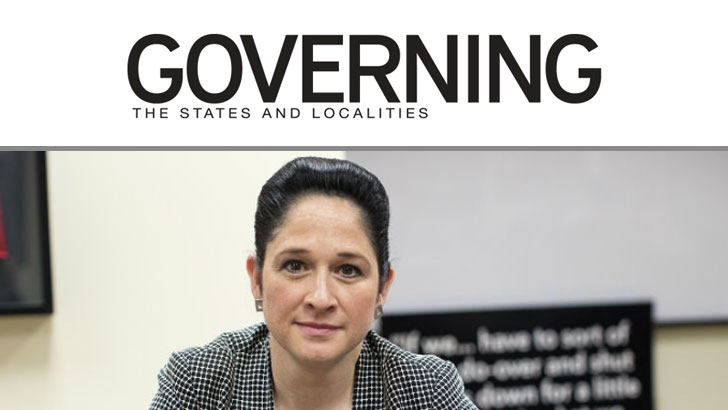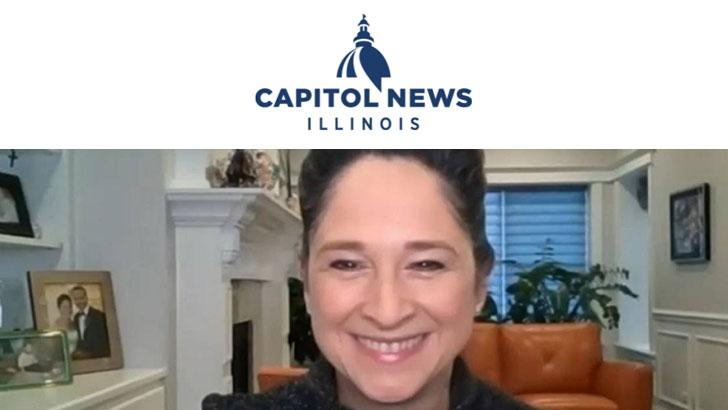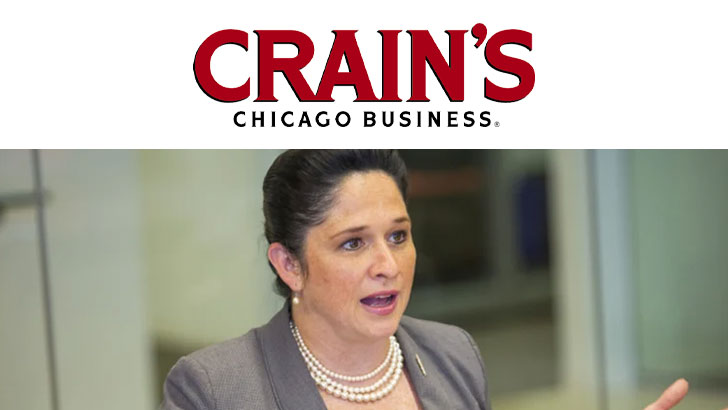In Illinois’ Ongoing Budget Crisis, She’s the Woman Deciding Who Gets Paid

Illinois comptroller wants halt to payroll “off-shoring”
March 9, 2018
Op-Ed: Illinois comptroller responds to editorial on state finances, politics
May 5, 2018—ô Governing Magazine | Vock, D. —
Susana Mendoza knew she was walking into a tough job well before she ever assumed office as the comptroller of Illinois in December 2016. She attended a conference of state treasurers, auditors and comptrollers as a candidate, and, as soon as she told other attendees she came from Illinois, she says, they would say, ãOh boy, you have your hands full!ã
Indeed, being Illinoisã chief check-signer is one of the toughest jobs in any state government these days. The state currently has $8.1 billion worth of bills waiting to be paid. Thatãs a problem when the state ends a business day, as it did one day recently, with just $290 million in cash. Itãs up to the comptroller to decide who gets paid and when, whether thatãs bondholders or nursing home operators or vendors who supply food to state prisons.
If the financial pressures werenãt enough, the stateãs ongoing fiscal problems have transformed the comptrollerãs office from a sleepy hideout for good government advocates into a major political battlefield.
Who Ruined Illinois? Both Illinois Candidates for Governor Avoid the Stateãs Most Pressing Issue Illinois Governor Ekes Out Primary Win
Mendoza, a Democrat who previously served as a state legislator and Chicago city clerk, often clashes with Republican Gov. Bruce Rauner. Mendoza knocked off a Rauner appointee in a heated 2016 special election, and theyãve been at it ever since. ãThe hardest part of the job,ã she says, ãis to play the yin to the yang of the governor.ã
The two officials disagree on basic principles of running government, ranging from the prospect of letting Illinois seek bankruptcy-like protections for mounting pension debts (he favors it; she doesnãt) to the day-to-day financial reporting requirements for state agencies. This week, they fought over who was more at fault for the state accruing $1.14 billion in late fees for past-due bills since 2015.
But the rivalry has also become very personal. Rauner has called Mendoza a ãpuppetã of Illinoisã long-serving House speaker, Michael Madigan. In November, the comptroller took a dig at the fabulously rich governorãs penchant for sporting cheap clothing when she suggested Rauner was ãall Carhartt and no heart.ã
The two have never had a face-to-face meeting to discuss the stateãs finances, Mendoza says.
ãPeople ask, ‘How are you possibly navigating through that?’ã Mendoza says of the financial officials in other states. ãI say, ‘You do what you have to do.’ Itãs all I know: Right now as comptroller is a bad time.ãã
And things may not get much better for a while. Illinois lawmakers ended an unprecedented two-year budget standoff last summer, when the Democratic majorities and a handful of Republican legislators overrode Raunerãs veto of a budget that included an income tax hike. But that budget is set to expire at the end of June, and itãs unclear whether the governor will negotiate a budget with the same Democrats he is blasting on the campaign trail for tax hikes and corruption in Springfield. Any hiccup in the budget process could trigger a bond downgrade by Wall Street rating agencies, which could have far-reaching consequences because two of the three major firms rate Illinoisã bonds just a notch above junk status.
Gabe Petek, the Illinois credit analyst for S&P, the bond rating firm, credits Mendoza for using the ãsoft powerã of her office to help the state navigate its financial troubles, especially during the budget standoff that finally ended last year. Mendoza raised the alarm about the state running out of money to pay court-ordered medical bills, but it was ãcomforting,ã Petek says, that she ãconsistently reiterated that the debt service would be funded.ã He also says her advocacy for the Debt Transparency Act helped state officials and the public better understand exactly how much Illinois owed in unpaid bills.
But Eric Kim of Fitch Ratings takes a different view. ãComptroller Mendozaãs efforts thus far, while commendable, do not materially affect our current assessment of Illinoisã credit rating,ã he says. ãThe stateãs operating performance remains weak and its financial resilience has been hampered by large unfunded retiree benefit liabilities and substantial budgetary liabilities.ã
Governing met with Mendoza recently in her office in the Thompson Center in Chicago to get a better sense of how Illinoisã budget battles looked from the front lines. Mendoza addressed the stateãs financial difficulties, how politics has complicated the job of managing those finances, and how Illinois could eventually pull itself out of its financial problems.
The following are edited highlights from that conversation.
On the severity of Illinoisã budget situation
ãI think weãre in a class of our own,ã Mendoza says. Thatãs not just because of the feedback from her colleagues at the National Association of State Auditors, Comptrollers and Treasurers. Her day-to-day decisions involve a lot more than keeping the books.
ãItãs not so much the nuts and bolts of the money, but what it means when people arenãt getting paid,ã she says. ãIt means businesses closing down. It means people getting laid off from their jobs, [and] the more businesses that close, the more people lose their jobs, the less tax money is entering into the state coffers. Itãs a really, really vicious cycle.ã
And then thereãs the fact that, with the state owing so much for medical and basic human services, her actions can literally affect who lives and who dies. ãEven when I was running, I always thought, yes, I get to advocate for vulnerable populations or people who need our help. But I never really thought I would be making life-and-death decisions.ã
On deciding who gets paid first
With only a little amount of money to dole out every day, Mendoza says she prioritizes payments to certain groups, such as services for sick and vulnerable populations, children or adults with disabilities, and schools and colleges.
But even then, there are tough calls. ãIt really is like triage,ã she says. There are three categories of recipients, she says: those that will definitely do better once they receive the money the state owes them; those that might recover; and those that ãno matter how many resources you put into them, are beyond helping. Thatãs what we donãt always want to talk about.ã
What about bondholders?
Even when the stateãs budget crisis reached its worst point last year, Mendoza repeated the message over and over again that the state would pay its bondholders, no matter what. She said that even as the state was being threatened with contempt of court for not paying Medicaid providers quickly enough.
ãI think we instilled a lot of confidence in the markets when I said that, no matter what, we would not default on our debt service payments. No matter what. They could literally take that to the bank,ã she says.
ãI understood that, even if I wanted to make, from a moral perspective, the payments to the most vulnerable groups,ã she says, ãif I were to default on debt service payments, Iãm going to hurt the very people weãre trying to help today, because weãll never have access any kind of capital to make other, more important payments down the road.ã
On Rauner forcing a crisis
At the same time, though, Illinois has the worst bond ratings of any state. After two ratings agencies dropped Illinoisã ratings to within one notch of junk bond status last year, Rauner said he ãwouldnãt be surprised if thereãs more ratings downgrades, there should be, because the majority in the General Assembly wonãt get a balanced budget.ã He also said, ãDonãt listen to some Wall Street firm. Thatãs not what matters. Listen to the people of Illinois.ã
Mendoza thinks Rauner wanted to create chaos with another downgrade, pointing to his support for federal legislation allowing states to seek bankruptcy-like protections to reduce their pension debts (they are not legally able to now) and his dismissive attitude toward the possibility of Illinois bonds being rated as junk.
ãI think the governor, absolutely, on purpose, created this fiscal crisis. I say that without equivocation. Yes,ã she says.
ãOn the very eve getting a budget passed, when we were teetering on the brink of going into junk bond status, here I am telling the markets, ãDonãt worry, Iãm going to make the debt service payments no matter what.ã And then Gov. Rauner is saying, ãDonãt listen to the markets! The people donãt want a tax increase. Donãt listen to Wall Street.ãã
ãI thought, oh my God, he is metaphorically giving them the finger,ã she says. ãThis madman is running this state into the ground.ã
On the reasons for the Debt Transparency Act
Most states, including Illinois, donãt have much experience with multibillion-dollar backlogs that stretch for nearly a decade, so they donãt have formal ways of accounting for one when it happens. In Illinois, the comptrollerãs office tallies all the bills it has left to pay, but governors from both parties have tried to mask the size of the backlog by having state agencies that incurred the bills delay turning them over to the comptrollerãs office. That essentially created a backlog to the backlog.
This became such a big problem that, in 2013, the legislature required the executive branch to inform the comptrollerãs office every October of how many bills were still left at the agencies. But Mendoza says that once-a-year requirement still left her with no way to assess agency budgets in real time.
So she pushed a bill to require monthly reports from the agencies. The bill passed the legislature, but, Rauner vetoed it, calling it an attempt to have Mendozaãs office ãmicromanageã executive agencies. ãThatãs a make-work bill,ã he later added. ãWeãre going to waste a lot of money generating reports that are monthly that are going to be almost immediately worthless.ã He suggested the better approach would be to upgrade the stateãs computer systems, so that agencies could make that information available at any time.
Mendoza pressed her case with lawmakers, and pitched it to editorial boards. Republicans in the House could have torpedoed it, but the House ultimately voted unanimously in favor of overriding Raunerãs veto, clearing the way for Mendozaãs bill to become law, which it did.
Mendoza says the law will help lawmakers conduct better oversight of state agencies and draft more realistic budgets.
ãNow, if the Department of Corrections is given a $2 billion budget, and six months into the fiscal year, theyãre already at $1.8 billion, you can say, ãOK, clearly you guys are going to blow through your budget.ã Before, Iãd have no way to know that until theyãve already blown through their budget,ã she explains. ãThese are important red flags, so you can say, ‘We need to pay more attention here.’ã
On how the current crisis compares with the crises of the Blagojevich era
As a legislator, Mendoza supported legislation calling for the impeachment of Gov. Rod Blagojevich, who is now in prison on public corruption charges.
ãI know what itãs like to impeach a governor,ã she says. ãI never thought I would say, having lived through that experience, that we would have a worse governor than Rod Blagojevich. But we do.ã
ãPeople can critique me for saying that all they want, but itãs the truth. At the very least, under Rod Blagojevich, as distasteful as that guy was, we passed major initiatives like All Kids [a state program to expand health insurance for children]. That was a huge, huge deal in Illinois. We had in-state tuition for undocumented students. We had breast and cervical screening for women. All these initiatives that saved peopleãs lives or made their lives better,ã she adds.
On how Illinois can recover
Mendoza says Illinois can slowly work its way out of many financial problems. She says Illinois can increase revenue through a progressive income tax, and legalizing and taxing recreational marijuana.
But paying down Illinois’ bill backlog — or paying principle on the state’s $130 billion of unfunded pension liabilities — will take a long, long time. Even a ãfastã scenario for paying off the bill backlog, she says, would probably be a four-year term.
And she thinks thereãs no way for Illinois to avoid paying for its huge pension liabilities. Courts have consistently ruled that the Illinois constitution requires the state to do it.
ãWhoever the next governor is will have to deal with it, because it just continues to get worse and worse and worse. Weãre going to have to realize that the time has come that we have to pay up. We have to pay those obligations. We have to honor those contracts,ã she says.
Stay up to date
Sign up to be a part of Team Susana today! You will receive notifications on activities, announcements and more.





BGA David Greising: Illinois needs to rely on the right voices to get its financial house in order
Read more